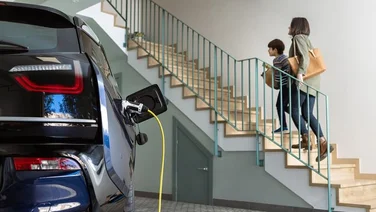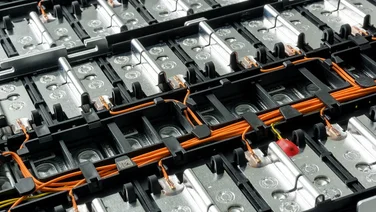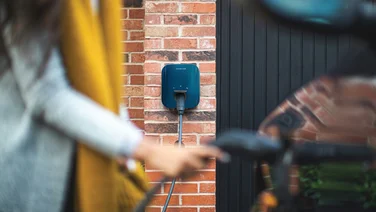We receive a small fee from trusted installers when you request a quote through our site. This helps us keep our content independent, well-researched and up to date – Learn more
- Each voucher can cover up to 75% of purchase and installation costs
- Employers will be eligible to install a maximum of 40 charging stations
- Companies can save up to £14,000 on purchase and installation costs
If you’re a business owner, you can reduce your company’s emissions and costs by investing in electric car charging points, you could end up paying less for them with the Workplace Charging Scheme.
The government introduced the scheme it a bid to increase EV uptake – in line with their goal to reduce emissions –, by making it easier for people to charge their cars.
Not familiar with this helpful grant? Find out everything you need to know about it, and how it can help you, by reading on.
And, if you wan to get an EV chargepoint, we can help with that. All you have to do is pop a few details in our quote comparison tool, and let us do the rest. We’ll put you in touch with our professional charging station installers, who will contact you with their best prices.
Get free EV charging point quotes
Answer a few quick questions, and our trusted installers will send you bespoke EV charging point quotes – for free.

What’s on this page?
What is the Workplace Charging Scheme?
The Workplace Charging Scheme (WCS) provides financial support for businesses by supplying vouchers that cover part of the upfront costs for EV charging stations.
Each voucher can cover up to 75% of the overall purchase and installation costs – or up to £350 for each socket – for a maximum of 40 charging stations across all sites.
These vouchers can only be redeemed by installers who have been authorised by the Office for Zero-Emission Vehicles (OZEV), as well as having approval from a charge point manufacturer. The charging points themselves will also need to be approved by OZEV.
Not sure who your nearest OZEV-authorised installer is? Check out the official list on the government website.
What are the key benefits of the scheme?
Workplace charging is great for everyone involved – employees can charge their cars whilst they work, and company vehicles can top up their batteries overnight.
But the Workplace Charging Scheme has more to offer than just convenience. By applying for the scheme, companies can:
- Save up to £14,000 on purchase and installation costs
- Decrease employee Benefit-in-Kind tax for company cars
- Reduce company fleet carbon emissions
- Shrink employee carbon footprints
Who is eligible for the scheme?
Good news – the Workplace Charging Scheme is available for all businesses, no matter how big or small.
The scheme is also set to be extended from early 2022, to include other businesses such as:
- Registered charities and small accommodation businesses – These will be able to claim the same amount as current eligible businesses
- Owners of commercially let properties – Funding of up to £350 per socket will be available, with a maximum of 100 installations each year. Owners must reserve parking spaces for their own staff or fleet, or for future tenants
- Small to medium enterprises (SMEs) – SMEs will be eligible for up to £15,000 per building, but only if they dedicate at least five private parking bays to electric vehicle charging. Applicants can claim up to five grants, but must have at least one working charging station in place following the first round of funding
Companies will also need to meet a few other conditions before they can be eligible for the scheme, including:
- Having off-street parking with enough space to install charging stations
- Demonstrating their need for an existing or future electric fleet (although, they don’t need to currently have electric vehicles as part of their fleet)
- Having charging stations installed by an OZEV-approved installer
- Registering with Companies House or having a VAT registration
- Providing private parking, reserved for staff or fleet use only
- Maintaining the charging points for a minimum period of three years
- Providing anonymous usage data to OZEV
If you’re not eligible for the scheme, you may be eligible for some of the other government EV charging point grants. Go to our page to see the full list.

When does the scheme end?
You can take your time applying for this grant, since the government hasn’t set an end date yet.
In fact, the government is doing the exact opposite by ramping up the scheme to encourage more people to use EVs.
Initially launched back in 2016, the Workplace Charging Scheme has since been renewed in December 2020, and is set to be further extended in 2022.
How to apply for the Workplace Charging Scheme
To apply for the scheme, you’ll need to head to the online application portal.
Before you start the application process, make sure to have the following information on hand:
- Contact details
- Evidence of eligibility
- Details of sites where the installations will take place
- Declaration of the current need for charging, or intent to encourage uptake of eligible EVs
- Conditions for use of the charge point
- Declaration of state aid (if you’re not sure what this is, check out the government’s useful explanation)
Once you’ve successfully completed the eligibility checks, you’ll be emailed a unique identification voucher code, which will be valid for six months and can be given to any OZEV-authorised installer.
Bear in mind that once the expiry date has passed, your installer will be unable to work on the charging point, so make sure to give yourself plenty of time before then.
The government is also keen to point out that any installations that have already been completed before a voucher has been issued will not be eligible for the grant.
Once the charge point installation has been completed, the authorised installer will claim the grant from the OZEV, on the applicant’s behalf, through the online installer portal.
Has the scheme been popular?
The WCS has certainly gained traction over the years.
As of 1 July 2021, the scheme has funded the installation of 16,975 sockets in workplace car parks since it began in 2016. Although this sounds like a lot, it could mean anywhere between 424 and 16,975 businesses.
However, there has definitely been a spike in interest in the past year. In fact, out of the total 16,976 installations, 7,118 sockets were installed in the last 12 months – up 72% from July 2020.
This increase in installations also aligns with the spike of EVs being bought in the UK. As you can see in the chart below, the number of registered electric cars in the UK grew massively throughout 2020.
Data from Statista
As the government continues to push for more EVs on the road, the number of workplace installations is bound to follow the same trend.
But despite growing popularity, only 55% of people would have an EV if it were free, according to our National Home Energy Survey.
Next steps
Thanks to various government initiatives, like the Workplace Charging Scheme, electric vehicles are on the up. It’ll only be a matter of time before we see more EVs on the road than petrol and diesel cars.
Tempted to get electric vehicle charging points for your business? We can help with that. All you have to do is pop a few details in our quote comparison tool, and let us do the rest. We’ll put you in touch with our professional installers, who will contact you with their best prices.








